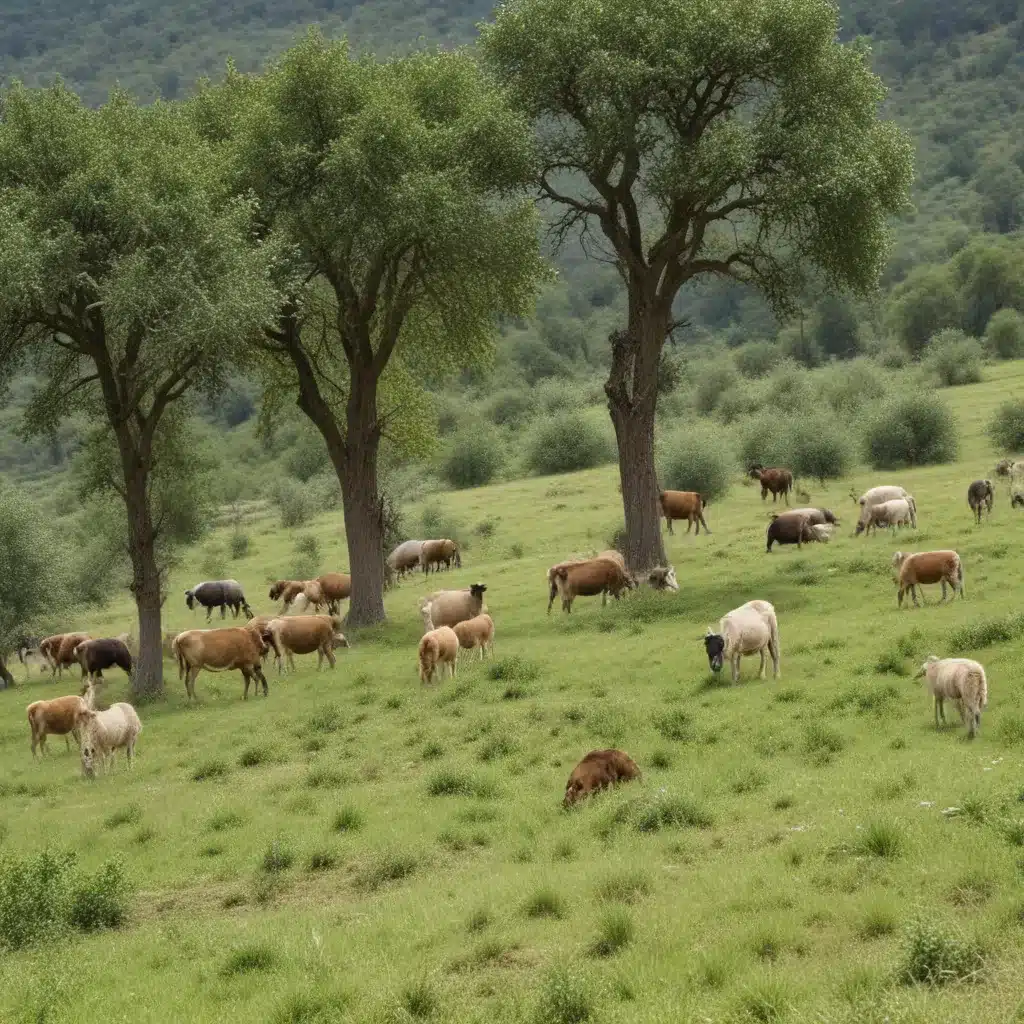
Harnessing the Power of Integrated Forestry and Grazing
In the face of escalating climate challenges, the Mediterranean region is experiencing a surge in the frequency and intensity of forest fires, droughts, and other environmental disturbances. As land managers and communities grapple with these threats, a time-tested agroforestry practice known as silvo-pastoralism is emerging as a key tool for enhancing landscape resilience.
Silvo-pastoralism is the integration of tree-based and livestock-based systems, creating a synergistic and multifunctional landscape. This approach combines the cultivation of trees, shrubs, and forages with the managed grazing of livestock, leveraging the complementary benefits of these elements. By embracing this holistic land management strategy, stakeholders in the Mediterranean can unlock a suite of advantages that bolster the region’s capacity to withstand and adapt to environmental changes.
Enhancing Biodiversity and Ecosystem Services
At the heart of silvo-pastoralism lies a fundamental principle: the cultivation of diverse plant and animal components within a mosaic landscape. This environmental complexity serves as a powerful safeguard against the impacts of climate change, providing multiple resources for feeding and shelter. By maintaining a diverse array of trees, shrubs, grasses, and livestock, silvo-pastoral systems enhance overall biodiversity conservation and the provision of vital ecosystem services.
“Silvo-pastoralism serves multiple purposes: it boosts land productivity, fosters stewardship, supports biodiversity conservation in open areas, and preserves traditional practices alongside mosaic landscape patterns.”
These systems can thrive in a variety of Mediterranean environments, including cultivated areas, rangelands, woodlands, and heaths. This adaptability is particularly valuable in harsh conditions characterized by challenging terrain, water scarcity, intense sunlight, and low soil quality – all common features of the region.
Mitigating the Threat of Forest Fires
One of the most pressing challenges facing the Mediterranean is the escalating risk of catastrophic forest fires, exacerbated by climate change. Silvo-pastoralism emerges as a strategic tool in this battle, as it can effectively reduce the accumulation of combustible biomass that fuels these destructive blazes.
By integrating livestock grazing into forested and woodland areas, silvo-pastoral systems actively manage the understory vegetation, keeping fuel loads in check. This proactive approach complements traditional fire suppression efforts, significantly enhancing the resilience of the broader landscape.
“Grazing in forests plays a vital role in controlling combustible biomass, monitoring the territory, and combating rural abandonment.”
The Fo.Re.S.T.A.S. Agency in Sardinia, Italy, is a prime example of how silvo-pastoralism can be leveraged for fire prevention. The agency manages over 220,000 hectares of forest land, issuing hundreds of pasture leases to support traditional production chains while also maintaining low biomass levels in strategic areas. This collaborative approach, involving the Civil Protection and Forest Service, has been crucial in the fight against the increasing threat of wildfires.
Innovative Practices and Technological Advancements
To further enhance the effectiveness of silvo-pastoral systems, stakeholders are exploring innovative practices and technological solutions. Within the FIRE RES and ResAlliance projects, researchers and practitioners are experimenting with novel machinery and grazing techniques to maintain low biomass levels in key areas, such as cork oak and pine woodlands.
One such innovation is the use of a small, multipurpose excavator equipped with shears and an innovative winch. This machine complements traditional methods relying on chainsaws, tractors, and winches, offering a more efficient and cost-effective approach to thinning and shrub removal. Additionally, the strategic placement of these “shaded fuelbreaks” in conjunction with planned grazing by goats has proven to be a highly effective fire mitigation strategy.
“The development of this innovative method faces several obstacles, including the acceptance of goat grazing by forestry services and managers, and the difficulty in calculating sustainable animal loads due to climate variability and soil vulnerability.”
However, project leaders have also identified facilitating factors, such as the improved organization and efficiency of log stacking and extraction, as well as the potential to reduce the costs associated with traditional fire prevention measures.
Fostering Collaboration and Community Engagement
Silvo-pastoralism’s success in the Mediterranean relies not only on technical innovations but also on the cultivation of strong partnerships and community engagement. The projects highlighted in this article have demonstrated the importance of fostering dialogue and cooperation among private and institutional stakeholders, including shepherds, foresters, and land managers.
By recognizing shepherds as essential contributors to fire prevention, rather than mere users of grazing rights, these initiatives have transformed the relationship dynamic. Shepherds are now engaged as providers of an invaluable ecosystem service, with their participation in planned grazing schemes being compensated accordingly.
“This paradigm shift – recognising breeders as contributors to fire prevention rather than problems – is essential in the current context of land abandonment and lack of stewardship.”
Establishing these mutually beneficial partnerships requires a significant investment of time and relational skills, as well as a commitment to building trust and understanding between all stakeholders. However, the payoffs are substantial, as these collaborations can lead to more effective fire prevention strategies, reduced costs, and the preservation of traditional land management practices.
Conclusion: Unlocking the Mediterranean’s Resilient Future
As the Mediterranean region grapples with the escalating threats of climate change, silvo-pastoralism emerges as a powerful tool for enhancing landscape resilience. By integrating tree-based and livestock-based systems, this agroforestry approach offers a multifaceted solution that addresses biodiversity conservation, ecosystem service provision, fire mitigation, and community engagement.
Through innovative practices, technological advancements, and collaborative partnerships, stakeholders in the Mediterranean can harness the full potential of silvo-pastoralism to create more resilient and adaptable landscapes. By embracing this holistic land management strategy, the region can pave the way for a sustainable future, empowering communities to withstand and thrive amidst the environmental challenges of the 21st century.
To learn more about the latest developments in silvo-pastoral systems and other landscape resilience initiatives, visit the Joint Action for Water blog, where experts share their insights and experiences from the Mediterranean and beyond.

